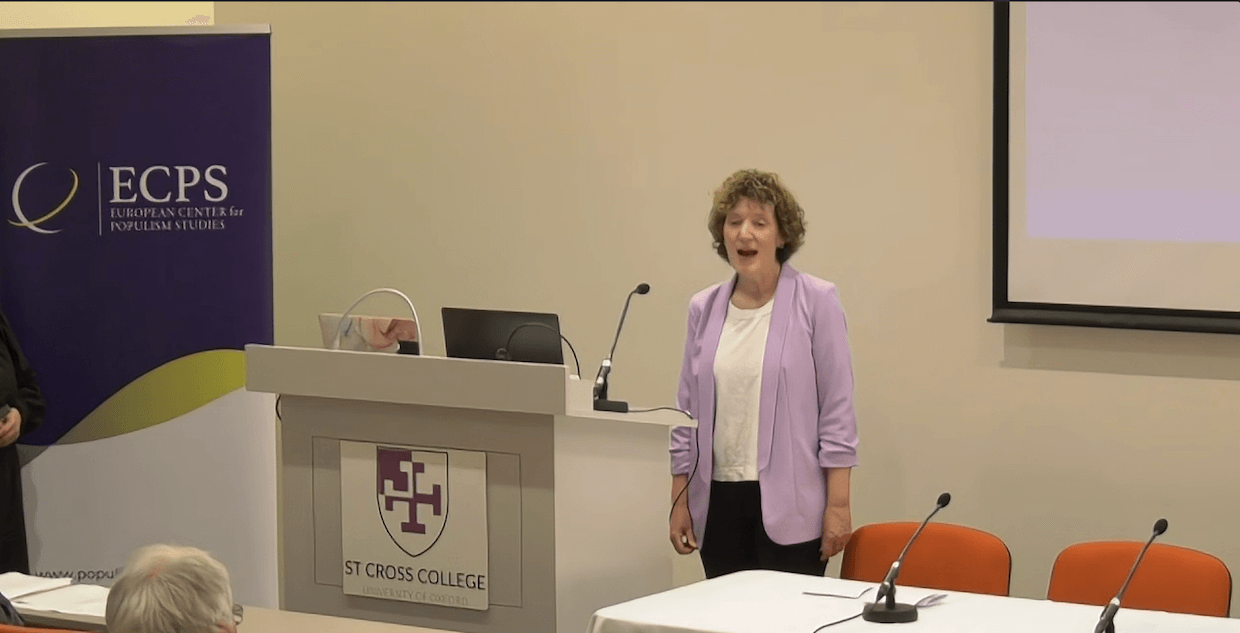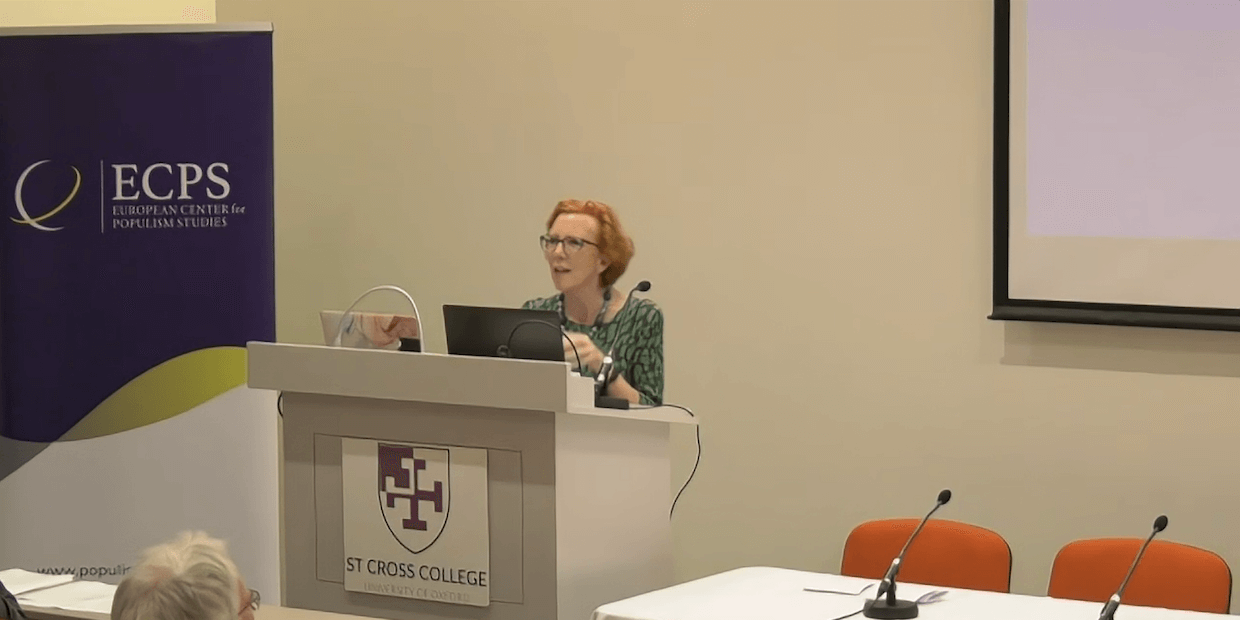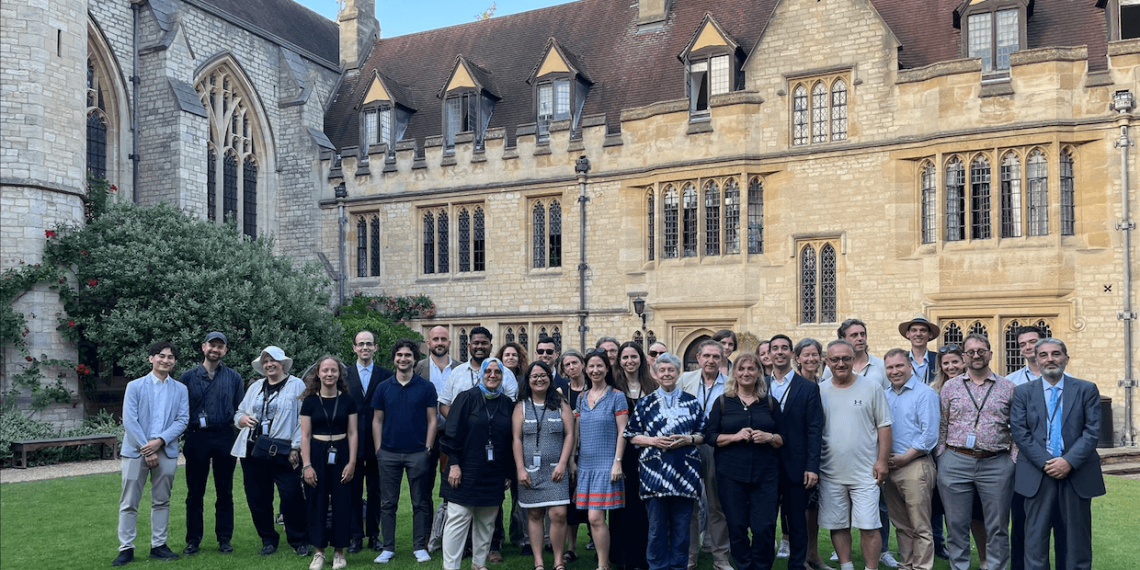Please cite as:
ECPS Staff (2025). “Opening Session of the ECPS Conference 2025: ‘We, the People’ and the Future of Democracy – Interdisciplinary Approaches.” European Center for Populism Studies (ECPS). July 8, 2025. https://doi.org/10.55271/rp00101
The ECPS Conference 2025 at the University of Oxford began with a timely and thought-provoking opening session that explored the evolving meaning and political utility of “the people” in democratic discourse. Sümeyye Kocaman offered a nuanced welcome, highlighting how the term has been used across history to empower, exclude, and politicize identity. Kate Mavor, Master of St Cross College, underscored the value of interdisciplinary exchange in addressing democratic challenges, noting how the College’s diverse academic environment aligned naturally with the conference’s aims. Baroness Janet Royall then delivered a compelling keynote, warning of the double-edged nature of “the people” as both democratic ideal and populist tool. Her address emphasized the need for inclusion, institutional integrity, civic renewal, and interdisciplinary cooperation in the face of democratic erosion. The session set the stage for critical and globally relevant dialogue across disciplines.
Reported by ECPS Staff
The opening session of the ECPS Conference 2025 at the University of Oxford commenced with a series of remarks that collectively set an intellectually rich and politically urgent tone for the days ahead. Sümeyye Kocaman, DPhil candidate at St. Catherine’s College and conference coordinator on behalf of the European Center for Populism Studies (ECPS), offered a thoughtful and inclusive welcome, grounding the event in the contested and evolving significance of “the people.” She reflected on how this concept—invoked across diverse historical, geographical, and ideological contexts—has served both emancipatory and exclusionary purposes. Drawing on her research and recent electoral analyses, she highlighted the growing resonance of populist narratives and the imperative to examine how democratic rhetoric shapes lived experience beyond the ballot box.
Following Kocaman, Kate Mavor, CBE, Master of St Cross College, welcomed participants on behalf of the host institution. Emphasizing the interdisciplinary character of St Cross—a graduate college home to scholars from over 60 fields—she noted the alignment between the conference’s aims and the College’s commitment to cross-disciplinary dialogue.
Baroness Janet Royall of Blaisdon, Principal of Somerville College, then delivered an incisive keynote, urging participants to confront the dual nature of “the people” as both democratic foundation and potential populist weapon. Her address called for rigorous, interdisciplinary engagement and collective democratic renewal.
Welcome Address by Conference Coordinator Sümeyye Kocaman
Sümeyye Kocaman, Managing Editor of Populism & Politics, and the coordinator of the ECPS Conference 2025 on behalf of the European Center for Populism Studies, opened the event with a thoughtful and inclusive welcome. Expressing gratitude to participants for arriving so promptly, she framed the conference around the contested nature of “the people.” Kocaman also highlighted the plurality and political weight of the term across time and place. From 19th-century American democratization to Cold War securitization and from the ideological symbolism of Albania’s People’s Republic to contemporary struggles for women’s rights and labor justice, she emphasized that invocations of “the people” are never ideologically neutral.
Kocaman noted that in populism studies, "the people" remains a central but fluid category—emerging in various forms such as “digital populism,” “climate populism,” and others. This terminological proliferation, she argued, speaks to the field’s theoretical dynamism but also to its increasing relevance in everyday political life. Drawing from her own research, she underscored the need to interrogate how notions of “the people” function not just in electoral discourse, but in the daily lived experiences of individuals and communities. This perspective, she asserted, is especially urgent in light of rising populist rhetoric across both Eastern and Western Europe, as recently documented in ECPS’s report on the EU elections.
Kocaman closed by acknowledging the collaborative support of academic and institutional partners—including the Rothermere American Institute, the European Studies Centre, Oxford’s Democracy Network, and scholars from Berlin and Brighton—and expressed solidarity with scholars unable to attend due to geopolitical crises. Her closing remarks served as a poignant reminder of the stakes of the conference: engaging critically with the idea of “the people” under conditions of global instability and democratic uncertainty.
Welcome Address by Kate Mavor on Behalf of the Host College

Kate Mavor, CBE, Master of St Cross College, opened the Conference with a warm and appreciative welcome to all participants. She expressed genuine delight that the conference was taking place at St Cross and extended her congratulations to Sümeyye Kocaman for organizing what she described as an exceptionally rich and meaningful academic program. She also offered thanks to Ben Gladstone, Junior Dean at St Cross, for his role in helping bring the event to the college.
Mavor took a moment to reflect on the nature of St Cross College itself—an entirely graduate institution at the University of Oxford, with approximately 620 students representing over 60 academic disciplines. She noted that this unique breadth makes the College an especially fertile ground for interdisciplinary dialogue, and she emphasized that hosting events like the ECPS Conference is very much in line with the College’s mission to encourage rigorous, open, and diverse scholarly conversations.
She acknowledged the topic of the conference—centered on the idea of “the people” and its implications for contemporary democracy—as both pressing and, in some respects, deeply unsettling. Yet she expressed hope that the conference would provide space for thoughtful, evidence-based discussion at a time when such engagement is more necessary than ever. She concluded by welcoming attendees once again and graciously passed the floor to Janet Royall, Baroness Royall of Blaisdon, Principal of Somerville College, Oxford University.
Keynote Address by Janet Royall (Baroness Royall of Blaisdon)

Baroness Royall, in her opening address, brought to the fore a compelling blend of political insight, institutional experience, and democratic advocacy. While modestly noting her non-academic background, she framed her intervention with both humility and urgency—an acknowledgment of the significance of the moment and the thematic depth of the conference.
Speaking from her current role as Principal of Somerville College and her former position as Chair of the People’s History Museum in Manchester—a self-declared “museum of democracy”—Baroness Royall underscored the symbolic and practical weight of convening such a conference at a time when democracy is under unprecedented strain. Her address moved fluidly from personal reflection to systemic critique, offering a panoramic view of the challenges and possibilities that define our democratic era.
Baroness Royall opened by commending the ECPS and conference organizers for their vision and rapid execution of a robust program. She recalled an early conversation in January 2025 with the conference coordinator, Sumeyye Kocaman, about an “embryonic” idea to convene a gathering on the theme of “We, the People.” In less than six months, that idea had matured into an intellectually rigorous and internationally inclusive conference. She highlighted the potential of this initiative to lay the groundwork for a broader academic and civic endeavor, notably the proposed Oxford Democracy Network—a platform to foster long-term collaboration around democratic renewal.
At the heart of Baroness Royall’s speech was the concept of “the people”—both as a foundational democratic ideal and as a source of contemporary political peril. She asked, pointedly, whether the title of the conference might have been better framed as “We, the People and the Precarious Future of Democracy.” This rhetorical shift captured her broader concern: that the invocation of “the people” has become a double-edged sword in today’s political landscape.
Baroness Royall cited the alarming statistic that one-fifth of the world’s democracies have declined or disappeared between 2012 and 2024, pointing to a structural crisis in democratic governance. This regression, she argued, is not attributable to a singular cause but reflects a toxic convergence of polarizing narratives, us-versus-them mentalities, and the erosion of social cohesion. Crucially, she emphasized that these trends do not signal the end of democracy, but rather call for its reinvention—grounded in inclusion, resilience, and renewed solidarity.
Drawing on her political experience, Baroness Royall articulated how the phrase “we the people,” while historically empowering—as in the US Constitution—can also be weaponized. When deployed inclusively, the phrase serves as a unifying force, anchoring citizenship in shared values and a common public life. However, in the hands of authoritarian populists, the same phrase is used to divide, exclude, and delegitimize. By framing political opponents as enemies of the people, populist leaders transform democratic mechanisms into tools of domination. Royall cited cases such as Hungary, India, Turkey, and the United States, where the language of majoritarian legitimacy is used to undermine pluralism, erode judicial independence, and roll back minority rights. In such contexts, democracy may persist in name but is hollowed out in substance.
To confront these challenges, Baroness Royall stressed the necessity of interdisciplinary engagement. No single field, she argued, can adequately diagnose or respond to the crisis of democracy. Political science and law illuminate how constitutions shape and channel power; sociology and anthropology explore the socio-cultural dimensions of exclusion and cohesion; history and philosophy provide the longue durée through which the evolution of “the people” can be understood; and media and technology studies reveal how digital platforms both fracture and connect public discourse. She notably added science to this list—an unusual but thought-provoking inclusion—arguing that scientific knowledge and the practices of truth-seeking are indispensable to democratic life. Citing Nobel Laureate Sir Paul Nurse, she affirmed that “democracy is built on truth and trust,” and that science, in its ideal form, sustains both.
Baroness Royall’s address was marked by a tone of constructive realism. While expressing concern over democratic decline, she rejected fatalism. Instead, she outlined a multidimensional agenda for democratic renewal. First, she called for a redefinition of “the people” as an inclusive and dynamic community, one capable of accommodating diversity without retreating into fragmentation. Here, she invoked the post-Apartheid experience of South Africa as a model for constructing cross-cutting civic identities that transcend ethnic or sectarian divisions.
Second, Baroness Royall underscored the need to reinforce institutional integrity. This involves defending the independence of the judiciary, safeguarding electoral systems, and protecting a free press—all vital bulwarks against the authoritarian temptation of majoritarian rule.
Third, she emphasized civic renewal through grassroots participation, deliberative assemblies, and public education. Democracy, in her view, is not merely a set of institutions but a culture of engagement—a shared commitment to dialogue, complexity, and the common good.
Fourth, she called for global solidarity. Authoritarian populism is a transnational phenomenon and demands coordinated international responses. Civil society watchdogs, transnational legal norms, and cross-border academic partnerships must be part of the democratic arsenal.
Turning to her own political reflections, Baroness Royall acknowledged the widespread disillusionment with politicians. She argued, however, that this disaffection is often rooted in unrealistic public expectations. Voters demand lower taxes, higher pensions, and expanded public services—expectations that cannot be reconciled without trade-offs. Populists exploit this cognitive dissonance by offering simple solutions to complex problems. In contrast, genuine democracy, she insisted, requires honesty—about limits, about governance, and about the costs of collective decisions.
She also lamented the decline of local journalism and the rise of disinformation—particularly via AI-generated content—which has fractured the public sphere. Without a shared reality, she warned, the very possibility of democratic deliberation is undermined. In this context, she called for renewed investment in the civic infrastructure of knowledge: public media, media literacy, and forums for reasoned debate.
Baroness Royall then addressed a structural limitation of democracy often left unspoken: the influence of global capital. She noted that the need to placate financial markets can restrict democratic choice, creating a form of “attenuated democracy” where formal procedures persist but real power is constrained. This reality, she argued, highlights the need for vigilance and adaptation to preserve meaningful democratic sovereignty.
In her concluding remarks, Baroness Royall affirmed the value of the ECPS conference and its role in advancing a crucial intellectual and political mission. The “We, the People” program, she said, addresses the central paradox of modern democracy: that the very concept designed to empower citizens can also be used to erode their rights. By combining rigorous scholarship with policy-relevant insights, the conference aims not only to diagnose democratic decay but also to formulate strategies for renewal.
Baroness Royall closed on a note of cautious optimism, invoking Antonio Gramsci’s famous formulation: “pessimism of the intellect, optimism of the will.” While the threats to democracy are serious, she maintained that collective action, informed deliberation, and institutional resilience can chart a path forward. She expressed hope that the conference would inspire not only intellectually stimulating discussions but also concrete contributions to policy and democratic reform.
Conclusion
The opening session of the ECPS Conference 2025 laid a compelling foundation for the days ahead, offering both a sobering diagnosis of democratic fragility and an urgent call for renewal grounded in intellectual rigor and interdisciplinary collaboration. Anchored by the interventions of Sümeyye Kocaman, Kate Mavor, and Baroness Janet Royall, the session deftly mapped the theoretical and practical stakes of examining “the people” as a contested and evolving concept at the heart of democratic politics.
Kocaman’s remarks highlighted the historical plurality and ideological malleability of “the people,” urging participants to interrogate its use not only in electoral campaigns but also in shaping everyday political experiences. Mavor emphasized the role of academic institutions in fostering open dialogue on questions of urgent public concern. Baroness Royall, meanwhile, offered a far-reaching keynote that moved from democratic theory to global political realities. Her speech underscored the double-edged nature of “the people” in democratic discourse—capable of both mobilizing collective agency and justifying exclusionary populism.
Collectively, these addresses set a tone of cautious optimism. While acknowledging the pressures of democratic backsliding, disinformation, and socio-political fragmentation, each speaker reaffirmed the possibility of renewal through civic education, institutional reform, and cross-sector dialogue. The session concluded with a clear message: that democracy cannot be taken for granted, and that critical, interdisciplinary engagement is essential not only for understanding the present crisis, but also for envisioning democratic futures that are more inclusive, participatory, and resilient. As the conference moves forward, the intellectual commitments voiced in the opening session will serve as both compass and challenge—calling participants to contribute meaningfully to the urgent task of democratic revitalization.


